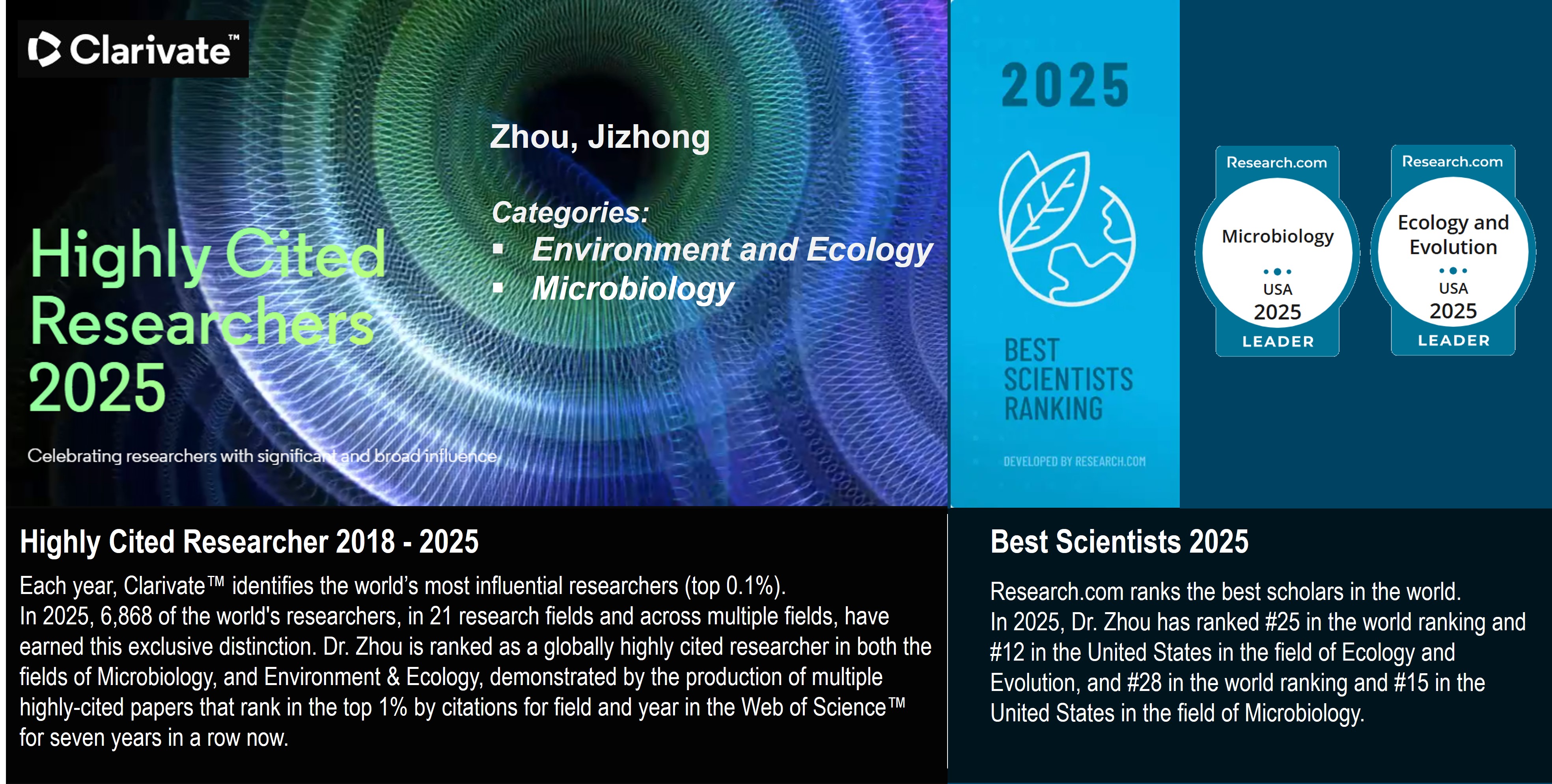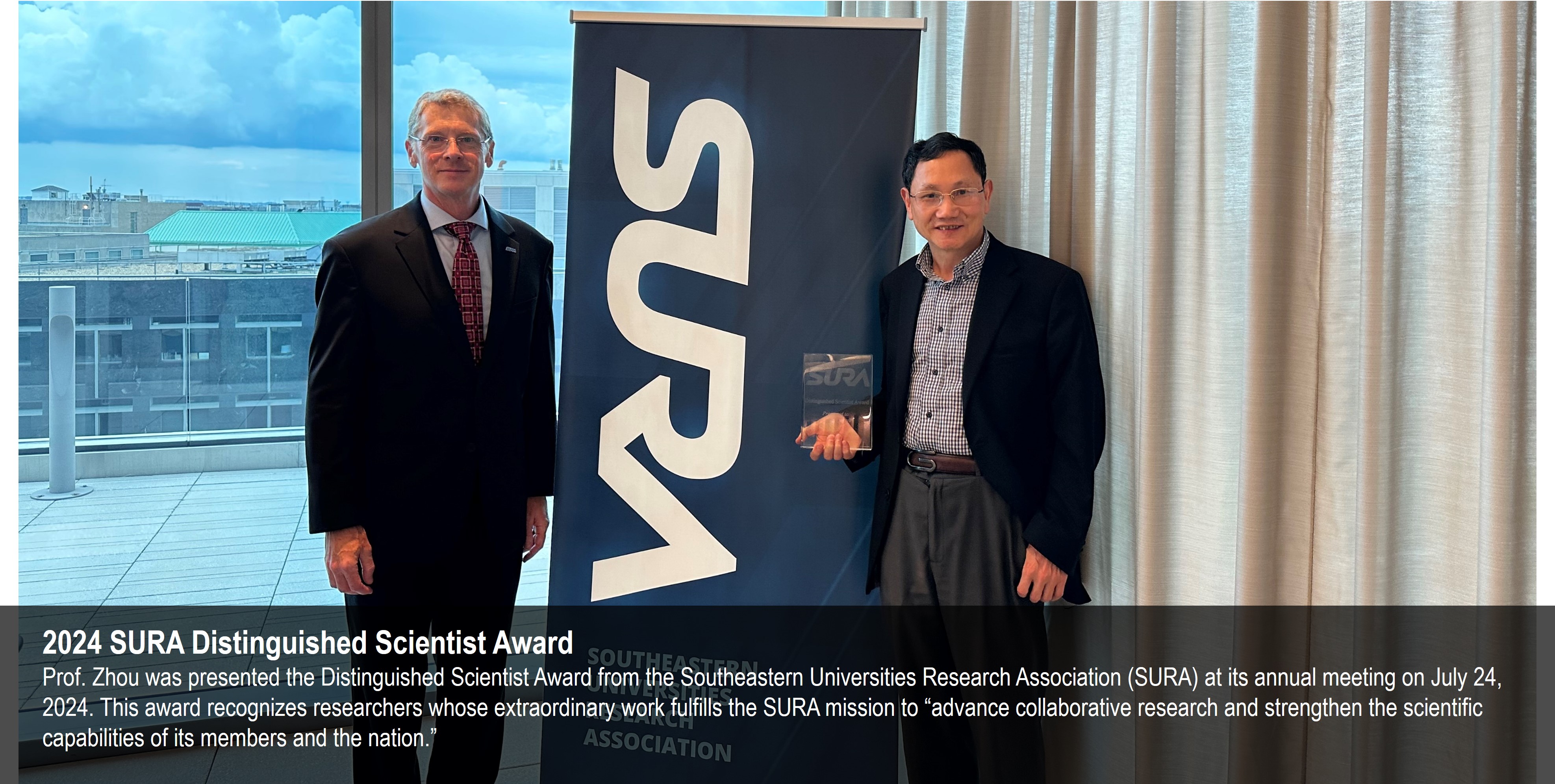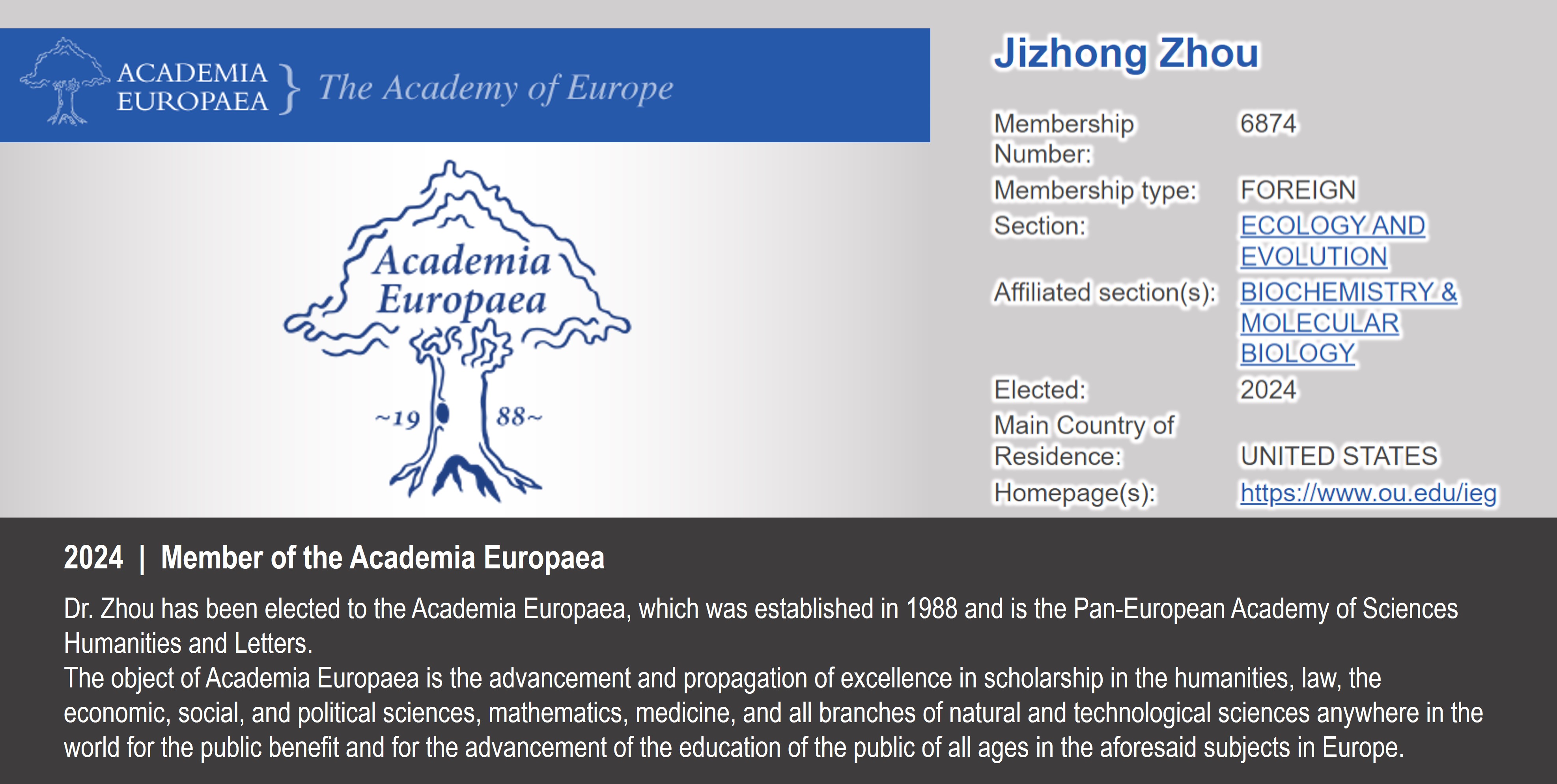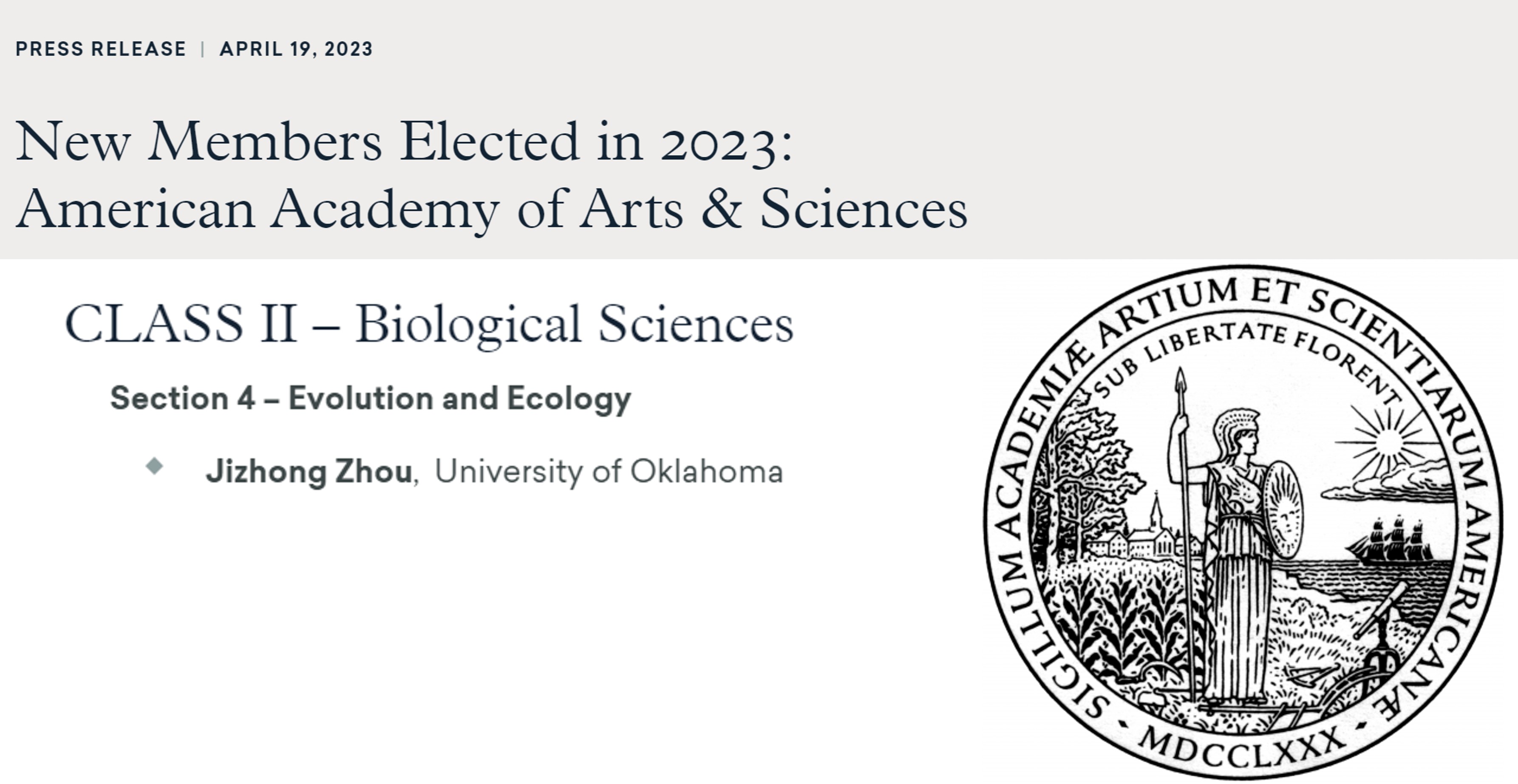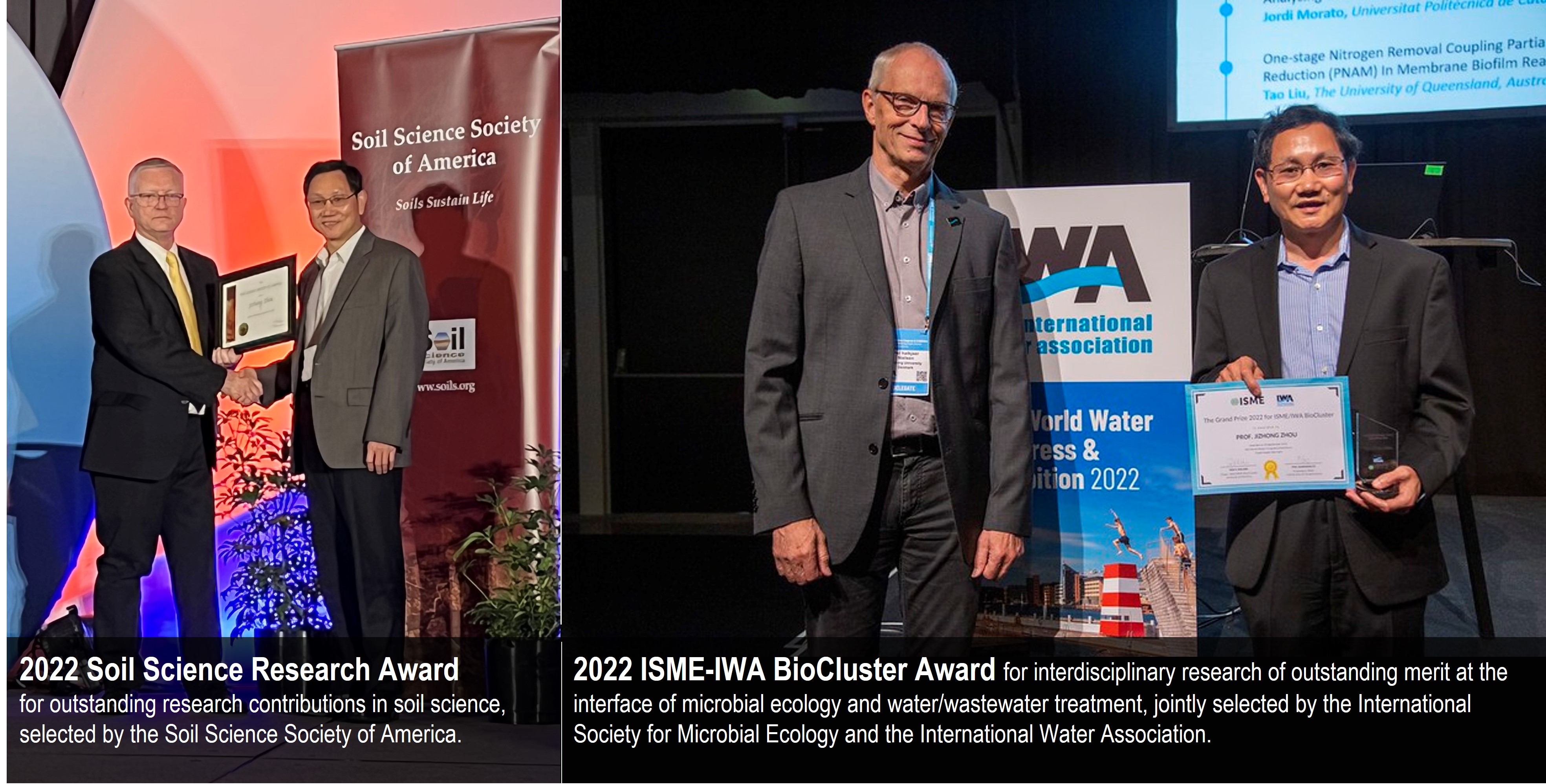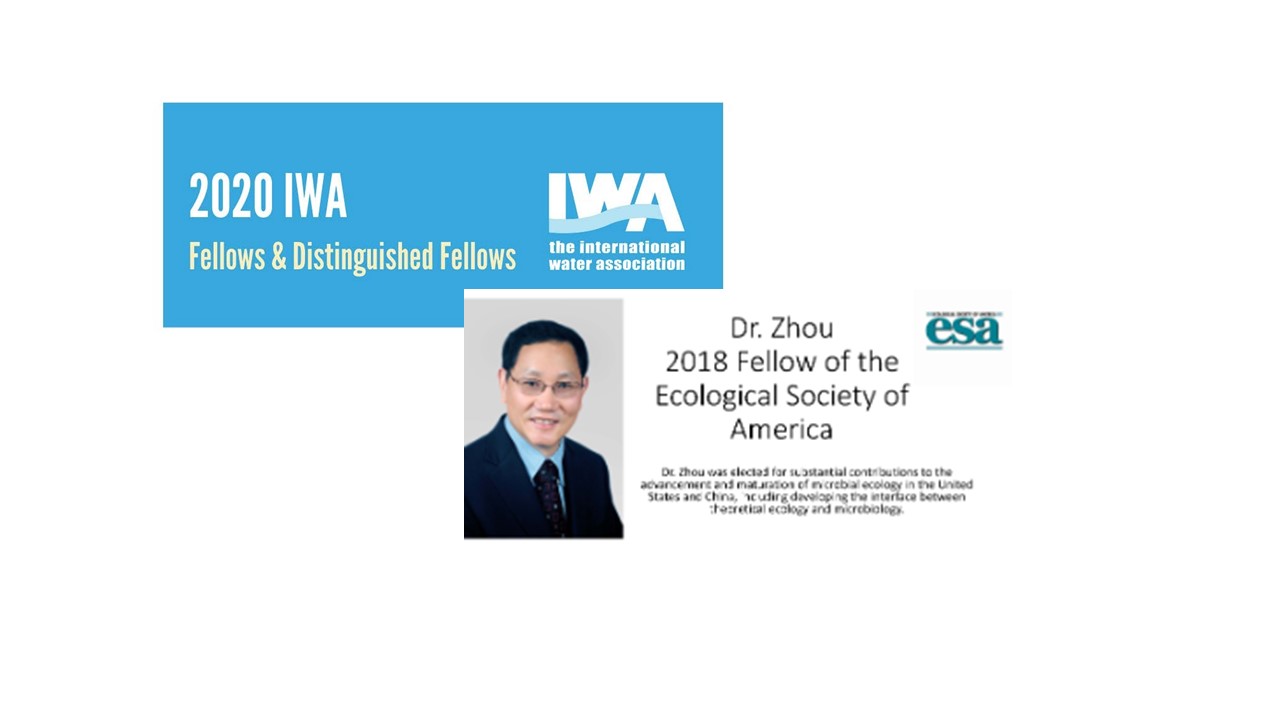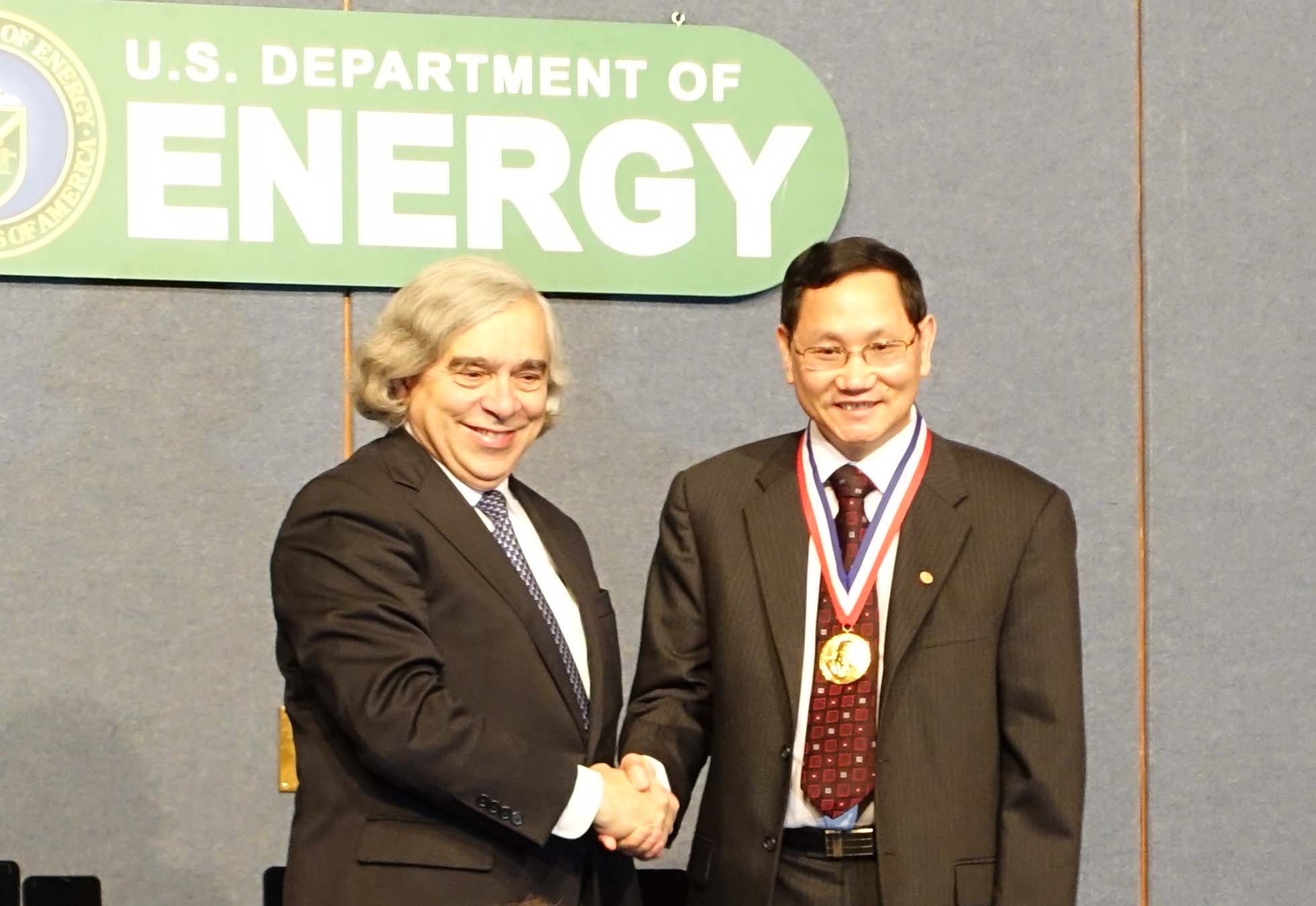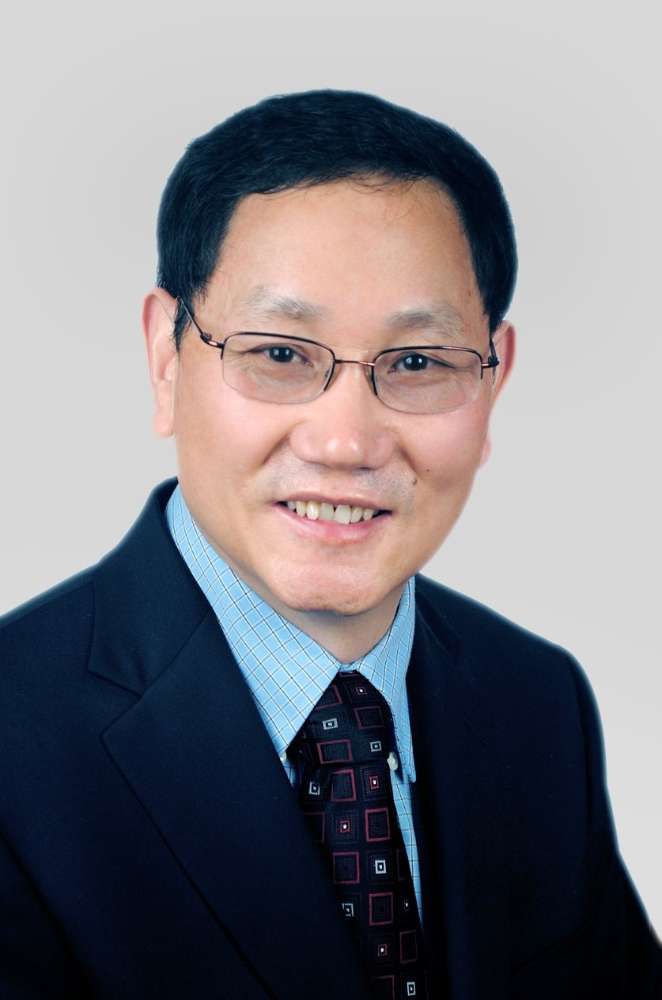Dr. Zhou’s outstanding achievements are recognized internationally as a top 0.1% global highly cited researcher by several major complementary metrics based on Elservier’s Scopus, Web of Science, and Research.com He was ranked at the top #25 scientist worldwide and top #12 across US in Ecology and Evolution by Research.com, at the top #27 worldwide and #14 in US in the field of Microbiology (link), and is the only microbiologist among the 2021 Reuters List of World’s Top 1,000 most influential Climate Scientists. Dr. Zhou’s science leadership is also demonstrated by his professional service, as an Editor-in-Chief for mLife, a senior editor for mBio, a former Senior Editor for The ISME Journal (a prime microbial ecology journal), and formal Editor for Applied and Environmental Microbiology. He has been a US Ambassador to the International Society of Microbial Ecology (ISME), and an Honorary Director for the Chinese Association of Microbial Ecology (CAME) – a major professional organization for microbial ecology in China. CAME established an award under his name in 2017 to recognize Outstanding Microbial Ecologists.
In recognition of his achievements in research, Dr. Zhou received Distinguished Scientist Award by Southeastern Universities Research Association (SURA) for recognizing scientists who are performing world-leading research in 2024, ISME-IWA BioCluster Grand Prize Award for recognizing the importance and impact of interdisciplinary research at the interface of microbial ecology and water/wastewater treatment in 2022, the 2022 Soil Science Research Award for recognizing outstanding research contributions in soil science, the 2019 ASM Award for Environmental Research for recognizing an outstanding scientist with distinguished research achievements in microbial ecology and environmental microbiology, DOE’s Ernest Orlando Lawrence Award in 2014 (also received U.S. Congressional recognition) – one of the highest honors presented by the U.S. government in science, R&D 100 Award in 2009 as one of 100 most innovative scientific and technological breakthroughs, and Presidential Early Career Award for Scientists and Engineers in 2001. He is a member of US National Academy of Sciences, American Academy of Arts and Sciences (AAA&S), a foreign Member of Academia Europaea (MAE), and a Fellow of the Ecological Society of Ecology (ESA), the American Academy of Microbiology (AAM), Soil Science Society of America (SSSA), International Water Association (IWA), and the American Association for the Advancement of Science (AAAS).
Major Awards
- Distinguished Scientist Award by Southeastern Universities Research Association (SURA)
- 2024, Inaugural Lifetime Achievement Award from University of Oklahoma
- 2022, ISME-IWA BioCluster Grand Prize Award
- 2022, SSSA Award for soil science
- 2019, ASM Award for Environmental Research
- 2015, The Ernest Orlando Lawrence Award
- 2009, R & D 100 Award for GeoChip development
- 2001, Presidential Early Career Award for Scientists and Engineers (PECASE)
- 1996, Alexander Hollaender Distinguished Postdoctoral Award, DOE
Major Honors
- 2025, US National Academy of Sciences
- 2024, Member of Academia Europaea (MAE)
- 2024, Fellow of Soil Science Society of America (SSSA)
- 2023, Member of American Academy of Arts and Sciences
- 2023-present, ranked at the top #30 scientist worldwide and top #14 across US in Ecology and Evolution by Research.com, at the top #38 worldwide and #20 in US in the field of Microbiology.
- 2021, Among the 2021 Reuters List of World’s Top 1000 Climate Scientists
- 2020, Fellow, International Water Association.
- 2018-present, top 0.1% highly Cited Researcher in both fields of Microbiology, and Environment & Ecology by Web of Science, Only 6% of the highly cited researchers appear in > two fields.
- 2019-present, World’s most cited researcher (top 0.05%) across all science & engineering fields
- Most highly cited researcher (H-index > 100) according to their Google Scholar Citations
- 2018, Fellow of the Ecological Society of America
- 2014, George Lynn Cross Research Professor
- 2008, Fellow of American Association for the Advancement of Science
- 2007-present, Honorary Director, Chinese Association of Microbial Ecology (CAME)
- 2005, Fellow of American Academy of Microbiology
Journal Editor
- 2025-present, Senior Editor for mBio
- 2021-prsent, Co Editor-in-Chief, mLife
- 2019-Present, Associate Editor for Microbiome/Environmental Microbiome
- 2017-2023, Senior Editor, ISME Journal
- 2014-2020, Section Editor, Microbial Ecology and Evolution, BMC Microbiology
- 2009-2019, Senior Editor, mBio®, ASM flagship journal
- 2003-2013, Editor, Applied and Environmental Microbiology
Selected Publications
- Tao et al. 2024. Climate warming accelerates positive soil priming in a temperate grassland ecosystem. Nature Communications, 15:1178. (top 1% highly cited)
- Zhang et al. 2023. Experimental Warming Leads to Convergent Succession of Grassland Archaeal Community. Nature Climate Change, 13, 561–569
- Wu et al. 2022. Reduction of microbial diversity in grassland soil is driven by long-term climate warming. Nature Microbiology. 7, 1054–1062. (top 1% highly cited hot paper)
- Yuan et al. 2021. Climate Warming Enhances Microbial Network Complexity and Stability. Nature Climate Change, 11:343-348. (top 1% highly cited)
- Gao et al. 2020. Stimulation of soil respiration by elevated CO2 is enhanced under nitrogen limitation in a decade-long grassland study. Proc. Nat. Acad. Sci., 117: 33317-33324
- Guo et al. 2020. Gene-informed decomposition model predicts lower soil carbon loss due to persistent microbial adaptation to warming. Nature Communications. 11, 4897. doi:10.1038/s41467-020-18706-z.
- Guo et al. 2019. Climate warming accelerates temporal scaling of grassland soil microbial biodiversity. Nature Ecol & Evol., 3, 612–61.
- Guo et al. 2018. Climate Warming Leads to Divergent Succession of Grassland Microbial Communities. Nature Climate Change. 8:813-818 (top 1% highly cited)
- Xue et al. 2016. Tundra soil carbon is vulnerable to rapid microbial decomposition under climate warming. Nature Climate Change, 6: 595-600 (was top 1% highly cited)
- Zhou et al. 2012. Microbial Mediation of Carbon Cycle Feedbacks to Climate Warming. Nature Climate Change, 2:106-110. (top 1% highly cited)
- Deysh et al. 1998. Isolation of acidophilic methane-oxidizing bacteria from northern peat wetlands. Science, 282: 281-284.
- Zhu et al. 2025. Global Diversity and Distribution of Antibiotic Resistance Genes in Human Wastewater Treatment Systems. Nature Communications, 16: 4006; doi:10.1038/s41467-025-59019-3
- Wu, et al. 2019. Global diversity and biogeography of bacterial communities in wastewater treatment plants. Nature Microbiology, 4:1183–1195. (top 1% highly cited)
- Zhou et al. 2014. Stochasticity, Succession and Environmental Perturbations in a Fluidic Ecosystem. Proc. Nat. Acad. Sci., 111: E836-E845. (top 1% highly cited)
- Hazen et al. 2010. Deep-sea oil plume enriches Indigenous oil-degrading bacteria. Science, 330: 204-208. (top 1% highly cited).
- Xu et al. 2010. Responses of microbial community functional structures to pilot-scale uranium in situ bioremediation. ISME J, 4:1060-1070.
- Liu et al. 2003. Transcriptome dynamics of Deinococcus radiodurans recovering from ionizing radiation. Proc. Nat. Acad. Sci, 100: 4191-4196.
- Liu et al. 1997. Thermophilic Fe(III)-reducing bacteria from the deep subsurface: The evolutionary implications. Science 277: 1106-1109.
- Ning et al. 2024. Environmental stress mediates groundwater microbial community assembly. Nature Microbiology, 9:490-501. (Top 0.1% highly cited hot paper)
- Buzzard et al. 2019. Continental scale structuring of forest and soil diversity via functional traits. Nature Ecol. & Evol., 3, 1298–1308
- Zhou and Ning. 2017. Stochastic Community Assembly: Does It Matter in Microbial Ecology? Microbiology and Molecular Biology Reviews, 81:e00002-17 (top 1% highly cited)
- Zhou et al. 2016. Temperature mediates continental-scale diversity of microbes in forest soils. Nature Communication, 7:12083, doi:10.1038/ncomms12083 (top 1% highly cited)
- Zhou et al. 2013. Stochastic assembly leads to alternative communities with distinct functions. mBio, 4: e00584-12
- Zhou et al. 2008. Spatial Scaling of Functional Gene Diversity across Various Microbial Taxa. Proc Nat. Acad. Sci. 105: 7768-7773.
- Zhou et al. 2002. Spatial and resource factors influencing high soil microbial diversity. Appl. Environ. Microbiol. 68: 326-334.
- Zhou et al. 2015. High-Throughput Metagenomic Technologies for Complex Microbial Community Analysis: Open and Closed Formats. mBio 6:e02288-14 (top 1% highly cited).
- Zhou et al. 2011. Reproducibility and Quantitation of Amplicon Sequencing-Based Detection. ISME J, 5:1303-1313 (top 1% highly cited).
- Zhou et al. 2013. Random Sampling Process Leads to Overestimation of β-Diversity of Microbial Communities. mBio 4: e00324-13.
- He et al. 2007. GeoChip: A comprehensive microarray for investigating biogeochemical, ecological, and environmental processes. ISME J, 1: 67-77 (Among the 5 top-cited papers for the first 10 years of ISME J).
- Zhou et al. 1996. DNA recovery from soils of diverse composition. Appl. Environ. Microbiol. 62: 316-322 (>3,900 citations) (Among the 20 most cited papers in AEM history, since 2008)
- Xiao, et al. 2022. Disentangling Direct from Indirect Relationships in Association Networks. Proc. Nat. Acad. Sci., 119 No. 2 e2109995119, https://doi.org/10.1073/pnas.2109995119. (top 1% highly cited)
- Ning et al. 2020. A quantitative framework reveals ecological drivers of grassland soil microbial community assembly in response to warming. Nature Communication, 11:4717. (top 1% highly cited)
- Ning et al. 2019. A General Framework for Quantitatively Assessing Ecological Stochasticity. Proc. Nat. Acad. Sci., 116: 16893-16898. (top 1% highly cited)
- Deng et al. 2016. Network succession reveals the importance of competition in response to emulsified vegetable oil amendment for uranium bioremediation. Environ. Microbiol., 18: 205-218; (top 1% highly cited).
- Deng et al. 2012. Molecular Ecological Network Analyses. BMC Bioinformatics, 13:113 (top 1% highly cited)
- Zhou et al. 2011. Phylogenetic molecular ecological network of soil microbial communities in response to elevated CO2. mBio 2: e00122-11. (top 1% highly cited)
- Zhou et al. 2010. Functional Molecular Ecological Networks. mBio 1:e00169-10
Education
- 1993, Ph.D. Molecular Biology, Washington State University
- 1984, M.S. Mathematical Ecology, Hunan Agricultural University, China
- 1981, B.S. Plant Pathology and Entomology, Hunan Agricultural University, China

